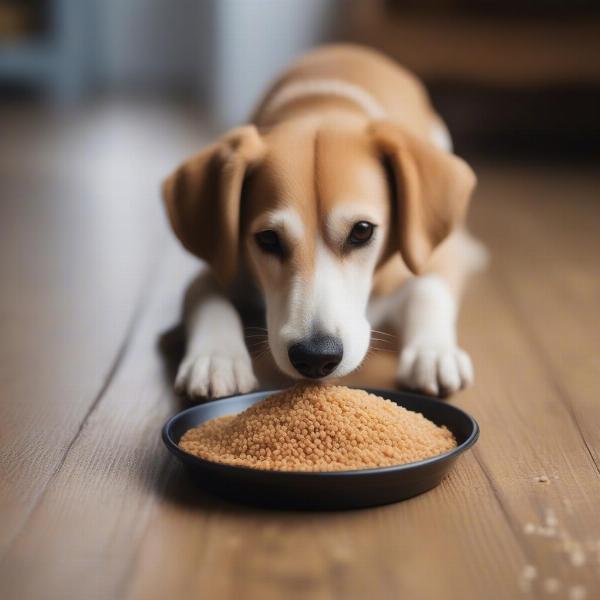Bulgur wheat is a popular whole grain in many cuisines, known for its nutty flavor and chewy texture. But is this healthy human food also safe for our canine companions? The short answer is: yes, dogs can eat bulgur wheat, but with a few important considerations. This article will explore the benefits and potential risks of feeding bulgur wheat to dogs, as well as guidelines for safe incorporation into their diet.
Nutritional Benefits of Bulgur Wheat for Dogs
Bulgur wheat offers several nutritional benefits for dogs, including fiber, which aids digestion and can help regulate bowel movements. It’s also a good source of B vitamins, essential for energy metabolism and nerve function. Additionally, bulgur wheat contains minerals like iron, magnesium, and manganese, which contribute to overall health. However, it’s crucial to remember that bulgur wheat should not replace a complete and balanced dog food but rather be offered as an occasional treat or supplement.
 Dog Enjoying Bulgur Wheat
Dog Enjoying Bulgur Wheat
Potential Risks of Feeding Bulgur Wheat to Dogs
While generally safe, bulgur wheat can pose some risks if not fed correctly. Some dogs might have a wheat allergy or sensitivity, leading to digestive upset or skin issues. Start with small amounts and monitor your dog for any adverse reactions. Also, bulgur wheat is relatively high in carbohydrates, so overfeeding can contribute to weight gain, especially in less active dogs. Always feed bulgur wheat in moderation. Lastly, avoid seasoned or flavored bulgur wheat intended for human consumption, as these can contain ingredients harmful to dogs, like onions or garlic.
How to Safely Feed Bulgur Wheat to Your Dog
If you’re considering adding bulgur wheat to your dog’s diet, it’s best to consult your veterinarian, especially if your dog has any pre-existing health conditions. They can advise on appropriate portion sizes and whether bulgur wheat is a suitable addition for your dog’s specific needs. When preparing bulgur wheat for your dog, make sure it’s cooked thoroughly and plain, without any added seasonings or fats. You can mix a small amount of cooked bulgur wheat with your dog’s regular food or offer it as a standalone treat.
Can Puppies Eat Bulgur Wheat?
While adult dogs can usually tolerate bulgur wheat in moderation, it’s generally best to avoid feeding it to puppies. Their digestive systems are still developing, and introducing new foods can cause upset stomachs. Stick to a high-quality puppy food formulated for their nutritional needs.
Bulgur Wheat vs. Other Grains for Dogs
Compared to other grains like rice and oats, bulgur wheat offers similar nutritional benefits. However, it has a slightly higher fiber content, which can be beneficial for dogs with digestive issues. If your dog has a wheat allergy or sensitivity, rice or oats might be better alternatives.
Conclusion
Bulgur wheat can be a healthy and nutritious addition to your dog’s diet when fed in moderation and prepared correctly. It provides fiber, B vitamins, and minerals that contribute to overall health. However, be mindful of potential allergies or sensitivities, and always consult your veterinarian before introducing new foods to your dog’s diet.
FAQ
- Can I feed my dog bulgur wheat every day? While it’s safe for most dogs to eat bulgur wheat, it’s best to offer it as an occasional treat or supplement rather than a daily staple.
- How much bulgur wheat can I give my dog? Start with a small amount (1-2 tablespoons) and monitor your dog for any adverse reactions. Adjust the portion size based on your dog’s size, activity level, and overall diet.
- What are the signs of a wheat allergy in dogs? Signs of a wheat allergy can include digestive upset (vomiting, diarrhea), skin issues (itching, redness), and ear infections.
- Can I feed my dog flavored bulgur wheat? No, avoid flavored bulgur wheat intended for human consumption, as it may contain ingredients harmful to dogs.
- Is bulgur wheat good for senior dogs? Bulgur wheat can be a good source of fiber for senior dogs, which can help with digestive regularity. However, always consult your veterinarian before making any dietary changes for a senior dog.
- Can dogs eat cracked wheat instead of bulgur wheat? Cracked wheat is less processed than bulgur wheat and can also be fed to dogs in moderation, following the same guidelines as for bulgur wheat.
- What other grains are safe for dogs? Other safe grains for dogs include rice, oats, barley, and quinoa.
ILM Dog is a leading international online resource dedicated to providing dog owners with expert advice and practical tips on all aspects of dog care. From breed selection and puppy care to senior dog health and training, ILM Dog offers a wealth of reliable information to help you provide the best possible care for your furry companion. Our experts cover a wide range of topics, including nutrition, behavior, grooming, and health. For more information on dog nutrition and dietary recommendations, visit ILM Dog. Contact us at [email protected] or +44 20-3965-8624.